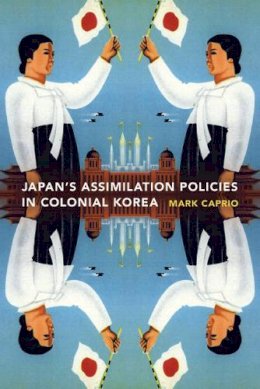11%OFF

Stock image for illustration purposes only - book cover, edition or condition may vary.
Japanese Assimilation Policies in Colonial Korea, 1910-1945
Mark E. Caprio
€ 37.99
€ 33.71
FREE Delivery in Ireland
Description for Japanese Assimilation Policies in Colonial Korea, 1910-1945
Paperback. During Japan's colonial rule over Korea from 1910 until the end of World War II, Japan adopted assimilation as its administrative policy but was unable to integrate the Korean people as Japanese. This book traces the history of this policy to determine why Japan failed to attain its stated goals. Series: Korean Studies of the Henry M. Jackson School of International Studies. Num Pages: 320 pages, 14 illus. BIC Classification: 1F; 1FPK; GTB; HBJF; JPA. Category: (P) Professional & Vocational. Dimension: 227 x 153 x 21. Weight in Grams: 494.
From the late nineteenth century, Japan sought to incorporate the Korean Peninsula into its expanding empire. Japan took control of Korea in 1910 and ruled it until the end of World War II. During this colonial period, Japan advertised as a national goal the assimilation of Koreans into the Japanese state. It never achieved that goal. Mark Caprio here examines why Japan's assimilation efforts failed. Utilizing government documents, personal travel accounts, diaries, newspapers, and works of fiction, he uncovers plenty of evidence for the potential for assimilation but very few practical initiatives to implement the policy.
Japan's early history ... Read more
Product Details
Format
Paperback
Publication date
2009
Publisher
University of Washington Press United States
Number of pages
320
Condition
New
Series
Korean Studies of the Henry M. Jackson School of International Studies
Number of Pages
320
Place of Publication
Seattle, United States
ISBN
9780295989013
SKU
V9780295989013
Shipping Time
Usually ships in 7 to 11 working days
Ref
99-1
About Mark E. Caprio
Mark E. Caprio is a professor in the Department of Intercultural Communications, Rikkyo University, Tokyo.
Reviews for Japanese Assimilation Policies in Colonial Korea, 1910-1945
"The significance of addressing Japanese colonial rule in Korea in a broader comparative context cannot be exaggerated. Caprio had made a perceptive, innovative, and welcome contribution to expanding the scope of Japanese, Korean, and colonial studies."
Marie Seong-Hak Kim
Journal of Japanese Studies
"His main purpose is to show, first how the colonial rulers of Korea tried ... Read more
Marie Seong-Hak Kim
Journal of Japanese Studies
"His main purpose is to show, first how the colonial rulers of Korea tried ... Read more
